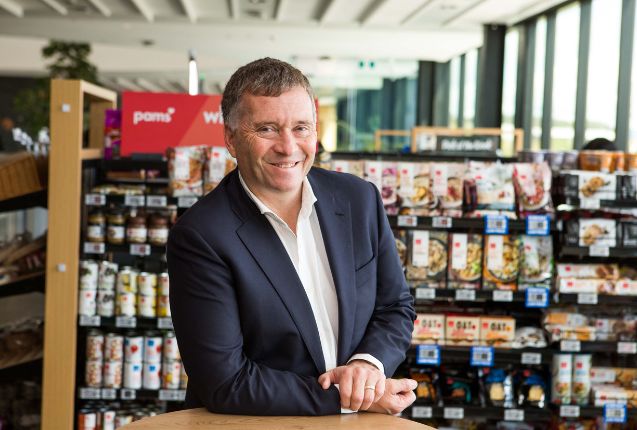The Foodstuffs grocery co-ops – whose member-families own the country’s 500+ PAK’nSAVE, New World and Four Square stores – say they have marked two years of efforts to tame food price inflation by again recording an average rate of price increases at their stores that’s under Stats NZ’s official rate.
In mid-2022, the co-ops started comparing the average rate of price increases across their stores, for foods in the same categories Stats NZ uses in its food inflation ‘basket’.* In the 24 months since, their average rate of increase has almost always been lower than Stats – as shown in the chart below – and in the latest month, April 2024, was just 0.4% year-on-year, compared to Stats’ official rate of 0.8%
Chris Quin, Foodstuffs NZ’s Managing Director, says the co-ops’ focus on fighting food inflation has been unwavering over the past two years, and made possible by buying well, running as efficiently as possible, and absorbing some cost pressures.
“New Zealand’s rate of food price rises is now significantly lower than most other developed countries,” says Quin. “Australia and the UK are both still seeing food inflation of around 4% per annum, Europe 3%, and the US around 2%. So, the rate here is now a half to a quarter what’s still being seen overseas.”
“That’s a huge relief for our customers, for our economy, and for our local store owners who’ve been hugely focused on playing a part in helping to tame food inflation, consistently recording price rises that are under the official rate in 22 of the past 24 months, at a time of a lot of economic uncertainty too.”
In April, the co-ops’ recorded a 3.0% year-on-year rise in what suppliers charge for the same goods in Stats’ basket. That aligns with the 3.0% rate Infometrics reported across a set of over 60,000 products.
“In the two years we’ve been watching this, our price increases for that basket, which has a lot of family staples, have almost always been lower than the rate of supplier cost increases for the same goods. As a trading nation, we’re very reliant on global markets and international suppliers when it comes to prices, hence why our co-ops must be as efficient as possible, to compete on the world stage.”
“Two years ago, when food price inflation took off, our 500-plus local store-owning families committed to fighting it for customers and being accountable by reporting on progress every month. We reinvest back into New Zealand by being resilient and proactive when faced with the big challenges. That’s one reason our proposal to merge into one national Foodstuffs co-op makes sense, as it will only boost our ability to keep stepping up for New Zealand consumers when we need to,” says Quin.

2024’s produce recovery eases cost of living
Bumper growing conditions for many crops after the cyclones of 2023 continue to be a key reason food price growth has slowed in 2024, with the 10 biggest price drops in April shown below:
| Item | YoY change (Apr 2024) | Item | YoY change (Apr 2024) |
| Cabbage (green) | ↓44% | Avocadoes (NZ) | ↓28% |
| Kūmara (orange) | ↓44% | Onions (brown) | ↓27% |
| Celery | ↓41% | Potatoes | ↓27% |
| Tomatoes | ↓36% | Beans (green round) | ↓26% |
| Broccoli | ↓29% | Kiwifruit (gold) | ↓24% |
Foodstuffs’ produce experts are expecting ongoing strong supply due to consistently stable weather over recent months, albeit with the potential for adverse impacts as colder temperatures set in.
At the same time, the co-ops’ logistics experts say diesel prices are higher than at the same time last year, with some ongoing holdups of freight moving through the Red Sea and Panama Canal.
Chris Quin says imports are a significant proportion of what New Zealanders buy each week, and the Foodstuffs co-ops invest a lot of time and energy on ensuring those products make it to store shelves.
“It’s important to remember in the debate over grocery competitiveness that a lot of what we buy for our customers comes from a few large multinational suppliers who set their own price terms, which is typically ‘the smaller you are the more you pay’. That includes many must-haves our shoppers expect.”
“That’s why having a strong New Zealand-owned grocery retailer is a positive for New Zealand, and it’s a key reason we’re seeking the greenlight to merge into one national Foodstuffs co-op for the future,” says Quin.



